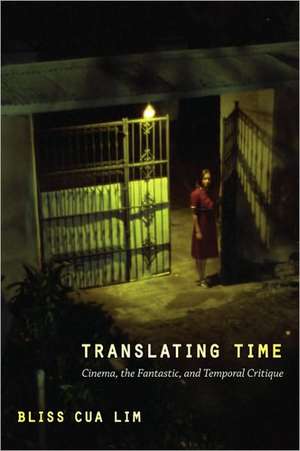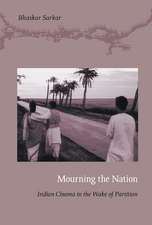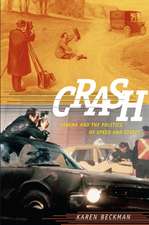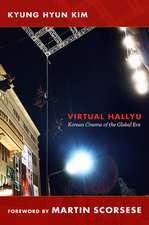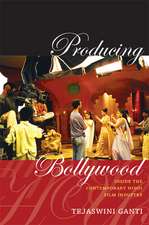Translating Time – Cinema, the Fantastic, and Temporal Critique: A John Hope Franklin Center Book
Autor Bliss Cua Limen Limba Engleză Paperback – 20 sep 2009
Lim interweaves scholarship on visuality with postcolonial historiography. She draws on Henri Bergson's understanding of cinema as both implicated in homogeneous time and central to its critique, as well as on postcolonial thought linking the ideology of progress to imperialist expansion. At stake in this project are more ethical forms of understanding time that refuse to domesticate difference as anachronism. While supernaturalism is often disparaged as a vestige of primitive or superstitious thought, Lim suggests an alternative interpretation of the fantastic as a mode of resistance to the ascendancy of homogeneous time and a starting-point for more ethical temporal imaginings.
Din seria A John Hope Franklin Center Book
-
 Preț: 172.64 lei
Preț: 172.64 lei -
 Preț: 131.28 lei
Preț: 131.28 lei -
 Preț: 158.53 lei
Preț: 158.53 lei -
 Preț: 211.58 lei
Preț: 211.58 lei -
 Preț: 210.26 lei
Preț: 210.26 lei -
 Preț: 152.87 lei
Preț: 152.87 lei -
 Preț: 166.71 lei
Preț: 166.71 lei -
 Preț: 174.94 lei
Preț: 174.94 lei -
 Preț: 240.46 lei
Preț: 240.46 lei -
 Preț: 176.33 lei
Preț: 176.33 lei -
 Preț: 203.54 lei
Preț: 203.54 lei -
 Preț: 247.91 lei
Preț: 247.91 lei -
 Preț: 240.15 lei
Preț: 240.15 lei -
 Preț: 261.56 lei
Preț: 261.56 lei -
 Preț: 250.92 lei
Preț: 250.92 lei -
 Preț: 264.05 lei
Preț: 264.05 lei -
 Preț: 348.61 lei
Preț: 348.61 lei -
 Preț: 219.58 lei
Preț: 219.58 lei -
 Preț: 219.58 lei
Preț: 219.58 lei -
 Preț: 266.18 lei
Preț: 266.18 lei -
 Preț: 202.41 lei
Preț: 202.41 lei -
 Preț: 183.56 lei
Preț: 183.56 lei - 23%
 Preț: 887.39 lei
Preț: 887.39 lei -
 Preț: 301.38 lei
Preț: 301.38 lei -
 Preț: 307.95 lei
Preț: 307.95 lei -
 Preț: 306.77 lei
Preț: 306.77 lei -
 Preț: 302.19 lei
Preț: 302.19 lei -
 Preț: 286.07 lei
Preț: 286.07 lei -
 Preț: 241.40 lei
Preț: 241.40 lei -
 Preț: 262.91 lei
Preț: 262.91 lei -
 Preț: 265.20 lei
Preț: 265.20 lei -
 Preț: 262.70 lei
Preț: 262.70 lei -
 Preț: 229.65 lei
Preț: 229.65 lei - 9%
 Preț: 709.73 lei
Preț: 709.73 lei -
 Preț: 222.15 lei
Preț: 222.15 lei -
 Preț: 362.25 lei
Preț: 362.25 lei - 12%
 Preț: 134.13 lei
Preț: 134.13 lei
Preț: 304.31 lei
Nou
Puncte Express: 456
Preț estimativ în valută:
58.25€ • 63.29$ • 48.96£
58.25€ • 63.29$ • 48.96£
Carte tipărită la comandă
Livrare economică 21 aprilie-05 mai
Preluare comenzi: 021 569.72.76
Specificații
ISBN-13: 9780822345107
ISBN-10: 0822345102
Pagini: 360
Ilustrații: 51 photographs
Dimensiuni: 156 x 237 x 25 mm
Greutate: 0.57 kg
Editura: MD – Duke University Press
Seria A John Hope Franklin Center Book
Locul publicării:United States
ISBN-10: 0822345102
Pagini: 360
Ilustrații: 51 photographs
Dimensiuni: 156 x 237 x 25 mm
Greutate: 0.57 kg
Editura: MD – Duke University Press
Seria A John Hope Franklin Center Book
Locul publicării:United States
Cuprins
Contents; List of Illustrations; AcknowledgmentsIntroduction. Clocks for Seeing: Cinema, the Fantastic, and the Critique of Homogeneous Time; 1. Two Modes of Temporal Critique: Bergsonism and Postcolonial Thought; 2. The Fantastic as Temporal Translation: Aswang and Occult National Times; 3. Spectral Time, Heterogeneous Space: The Ghost Film as Historical Allegory; 4. The Ghostliness of Genre: Global Hollywood Remakes the Asian Horror Film; Epilogue. Writing within Times Compass: From Epistemologies to OntologiesNotes; Bibliography; Index
Recenzii
Translating Time will set a new standard in cinema studies. It is not only deeply philosophical, bringing a much-needed postcolonial critique of historicism to cinema studies, but also a learned study of Asian, and especially Filipino, cinema in the context of postcoloniality and globalization. I learned an enormous amount from this book. It is quite an achievement. David L. Eng, author of Racial Castration: Managing Masculinity in Asian AmericaBliss Cua Lims extension of ideas about the uncanny, the fantastic, and the genre we usually call the horror film beyond the usual references to Hollywood and European cinema is fully welcome in this new era of global cinema. But Lim does much more than that. Her consideration of the uncanny and fantastic open up the profoundly untimely nature of fantastic filmsand new possibilities for conceiving the history of cinema.Tom Gunning, author of The Films of Fritz Lang: Allegories of Vision and ModernityTranslating Time is vital, fresh, expansive, and exciting. A strikingly sophisticated thinker, Bliss Cua Lim argues that a linear and progressive understanding of historical time (and its practice of history-writing) domesticates other times into a manageable past marked as retrograde, primitive, and naïve. Lim denaturalizes such an understanding by bringing to the fore films that depend on nonsynchronous histories. Her book will have readers far beyond the field of cinema studies, and it will push that field toward new and crucial questions.Amy Villarejo, author of Lesbian Rule: Cultural Criticism and the Value of Desire
Notă biografică
Textul de pe ultima copertă
"Bliss Cua Lim's extends ideas about the uncanny, the fantastic and the genre we usually call the horror film beyond its usual references to Hollywood and European cinema, which is fully welcome in this new era of global cinema. But it does much more than that. Her consideration of the uncanny and fantastic open up the profoundly untimely nature of fantasy films--and new possibilities for conceiving of the history of cinema."--Tom Gunning, author of "The Films of Fritz Lang: Allegories of Vision and Modernity"
Descriere
Postcolonial critique of the universality of historical time to propose a new way of considering the fantastic in Asian cinema
